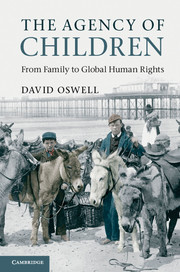Book contents
- Frontmatter
- Contents
- Figures
- Acknowledgements
- Part I Introduction
- Part II Social theories of children and childhood
- Part III
- 6 Family and household
- 7 School and education
- 8 Crime and criminality
- 9 Health and medicine
- 10 Play and consumer culture
- 11 Political economies of labour
- 12 Rights and political participation
- Part IV Conclusions
- Bibliography
- Index
10 - Play and consumer culture
Published online by Cambridge University Press: 05 April 2013
- Frontmatter
- Contents
- Figures
- Acknowledgements
- Part I Introduction
- Part II Social theories of children and childhood
- Part III
- 6 Family and household
- 7 School and education
- 8 Crime and criminality
- 9 Health and medicine
- 10 Play and consumer culture
- 11 Political economies of labour
- 12 Rights and political participation
- Part IV Conclusions
- Bibliography
- Index
Summary
The major economic significance of children’s role in consumption is with regard to the purchasing of everyday domestic items (such as soap powders and breakfast cereals) or large household items (such as cars, houses and holidays). Many of these items are manufactured by a small number of global corporations (such as Procter & Gamble or Toyota), who produce global brands that are sold through the main supermarkets and other retail outlets in conjunction with the main global advertising agencies. Advertisers often refer to the role of children in these household decisions in terms of ‘pester power’; sociologists tend instead to talk of agency and negotiation. However, instead of considering this, in Chapter 10 I want to look at how, from the mid eighteenth century onwards and rapidly developing in the twentieth century, there has been a convergence of investment in children’s play, consumer culture and the media industry. This chapter looks at the importance of children’s play and at how it has become a site of invention and innovation. It considers how the central tropes of play – freedom, growth through interactive object relations, and performance in and through friendship – provide the basis for the massive development of a consumer culture of childhood and its extension and mediation across many forms of everyday life (in the context of both adults and children). I will start by looking at a psychologist’s account of play, a psychoanalyst’s account of the child’s interaction with objects, and a sociological account of play as peer-group interaction. I then set this in the context of a social and cultural history of play, paying particular attention to the close relation between commerce, toys and play from the nineteenth century onwards. In contrast to a standard account of the encroachment of the child’s developmental space by commerical business, what we see is that the marketisation of play has been a site of productive innovation in children’s agency, in terms of both building capacity and also in proliferating and multiplying its forms. Recent advances in robotics, artificial intelligence and thinking about biological life have had an interesting synergy with developments in the toy industry and in reconstructions of play spaces and forms.
- Type
- Chapter
- Information
- The Agency of ChildrenFrom Family to Global Human Rights, pp. 193 - 214Publisher: Cambridge University PressPrint publication year: 2012



